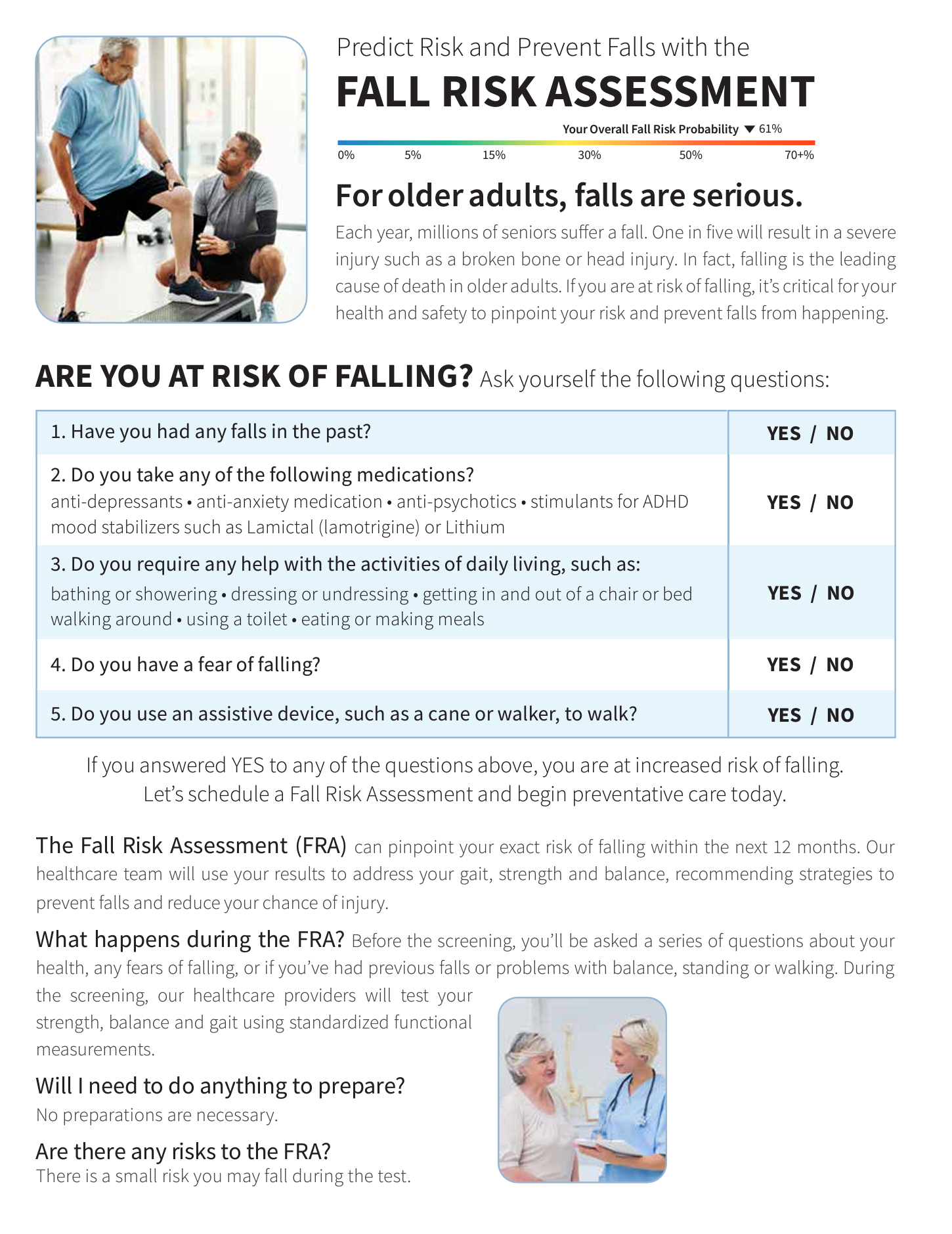Get This Report about Dementia Fall Risk
Table of ContentsWhat Does Dementia Fall Risk Mean?Rumored Buzz on Dementia Fall Risk10 Simple Techniques For Dementia Fall RiskOur Dementia Fall Risk StatementsThe Best Strategy To Use For Dementia Fall Risk
In the community, poor street lights or vulnerable creeks and garbage dumps may also trigger mishaps. Autumns Danger Assessment Device (FRAT) is a 4-item falls-risk testing device for sub-acute and residential treatment. The FRAT has three areas: drop threat condition, risk aspect list, and action strategy. A Fall Danger Condition consists of data concerning history of recent falls, medicines, mental and cognitive standing of the individual.If the individual scores on a risk element, the corresponding number of points are counted to the person's fall risk score in the box to the far. If a patient's loss threat rating totals five or greater, the person goes to high risk for drops. If the person scores only four points or reduced, they are still at some threat of dropping, and the nurse should use their best clinical evaluation to manage all loss threat factors as part of an all natural care plan.
These basic methods, in general, help establish a safe setting that decreases unexpected falls and delineates core preventive measures for all patients. Indicators are crucial for patients at threat for drops.
The Facts About Dementia Fall Risk Revealed
For instance, wristbands ought to consist of the person's last and very first name, date of birth, and NHS number in the UK. Details should be printed/written in black versus a white history. Only red shade should be used to signal unique person status. These recommendations are constant with present developments in individual identification (Sevdalis et al., 2009).
Items that are too much might need the individual to connect or ambulate needlessly and can possibly be a hazard or add to drops. Aids protect against the person from heading out of bed without any kind of help. Nurses respond to fallers' call lights faster than they do to lights launched by non-fallers.
Aesthetic disability can substantially trigger drops. Hip pads, when used appropriately, might minimize a hip fracture when fall happens. Keeping the beds closer to the flooring lowers the threat of drops and severe injury. Putting the bed mattress on the floor dramatically minimizes loss threat in some healthcare settings. Low beds are designed to lessen the distance a client falls after moving out of bed.
Excitement About Dementia Fall Risk
Clients that are high and with weak leg muscle mass who try to remain on the bed from a standing position are most likely to fall onto the bed due to the fact that it's as well reduced for them to lower themselves safely. If a tall patient attempts to get up from a reduced bed without support, the individual is likely to fall back down onto the bed or more helpful hints miss out on the bed and drop onto the flooring.
They're created to advertise prompt rescue, not to stop drops from bed. Distinct alarm systems can also remind the client not to rise alone. Using alarm systems can likewise be an alternative to physical restraints. Apart from bed alarm systems, raised guidance for risky individuals also might assist protect against drops.

Clients with a shuffling stride increase loss possibilities significantly. To reduce fall risk, footwear should be with a little to no heel, slim soles with slip-resistant walk, and sustain the ankle joints. Encourage patient to use nonskid socks to avoid the feet from sliding upon standing. Urge clients to wear suitable, well-fitting shoesnot nonskid socks for ambulation.
8 Simple Techniques For Dementia Fall Risk
In a study, homes with appropriate lighting report fewer drops (Ramulu et al., 2021). Improvement in lighting at home may minimize loss rates in older adults.

Sitters work for assuring a safe and secure, secured, and risk-free setting. Studies showed really low-certainty proof that caretakers lower loss threat in intense treatment hospitals and just moderate-certainty that choices like video clip surveillance can lower caretaker use without enhancing loss threat, suggesting that caretakers are not as beneficial as originally thought (Greely et al., 2020).
Some Of Dementia Fall Risk

Enhanced physical conditioning lowers the danger for drops and restricts injury that is sustained when loss transpires. Land and water-based workout programs might be similarly beneficial on balance and stride and therefore reduce the risk for drops. Water exercise might add a favorable benefit on balance and stride for females 65 years and older.
Chair Increase Exercise is an easy sit-to-stand exercise that aids enhance the muscular tissues in the thighs and buttocks and enhances movement and self-reliance. The goal is to do Chair Increase exercises without making use of hands as the customer ends up being more powerful. See resources area for a comprehensive guideline on exactly how to perform Chair Surge exercise.